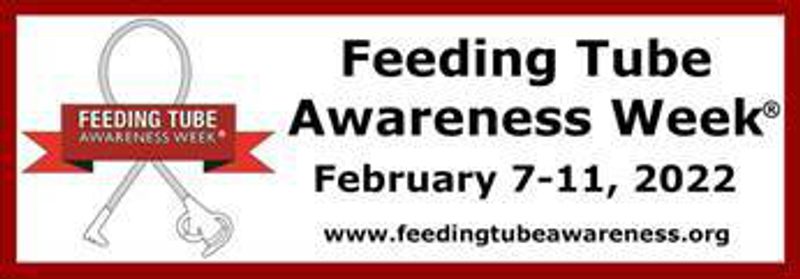
Posted on: February 08, 2022
Feeding Tube Awareness Week 2022 - supporting people to live, grow and thrive!
The 12th annual Feeding Tube Awareness Week® is taking place worldwide from 7-11 February 2022!
The mission of Feeding Tube Awareness Week is to promote the positive benefits of feeding tubes as lifesaving medical interventions – spreading awareness and providing education about feeding tubes and the importance of feeding tubes. Feeding tubes are a lifesaving and simple piece of medical equipment, which can be used for both children and adults for a variety of conditions.
During the height of the pandemic it is estimated up to 12,000 COVID-19 patients in the UK were on tube feeds, a huge increase in the demand for medical foods. Providing naso-gastric tube feeds was therefore essential to avoid malnutrition and dehydration, helping patients recover from the virus.
At the same time, there are a wide range of other patients who rely on tube feeds, including many in their own homes. According to the 2011 BAPEN BANS report, an estimated 16,982 children and over 26,600 adults receive home tube feeding.1
As well as home tube feeding for long term health conditions, other reasons why a patient may have to use a feeding tube for a shorter period include preparing for or recovering from surgery, a condition which may improve e.g. stroke, or those in intensive care.
Feeding tubes are required when nutrient requirements cannot be met by regular food intake. This can be a consequence of many clinical conditions, including illness, decreased appetite or difficulties in swallowing.
Enteral nutrition can be provided by tube feeding either via a naso-gastric tube placed through the nose, or a percutaneous endoscopic gastrostomy (PEG) tube directly into the stomach. Enteral nutrition requires a functioning, or at least a partially functioning, gut.
The choice of route depends on the clinical condition of the patient, their GI function, anatomy and access and expected duration of feeding. Whichever feeding tube is chosen, they all are important to enhance quality of life.
BSNA members have a wealth of experience in developing not only the tube feed formulas, but also the feeding tubes and equipment required for safe feeding. These feeds are highly regulated and used under medical supervision across a wide range of settings such as hospitals, care homes, clinics and private homes.
While there is little awareness of tube feeding for most people, for those patients who rely on them, tube feeds make it possible for them to receive appropriate access to the nutrition they need to live and avoid becoming malnourished. It is also is important for these patients’ to also have the support from friends and family on their tube feeding journey.
As we celebrate #FeedingTubeAwarnessWeek, BSNA supports the campaign’s focus on embracing the positives and being thankful that feeding tubes help people to live, grow and thrive!
#FeedingTubeAwarenessWeek
To find out more information, please visit www.feedingtubeawarenessweek.org
1 BAPEN. BANS: Annual BANS Report, 2011; Artificial Nutrition Support in the UK 2000-2010.
Available at https://www.bapen.org.uk/pdfs/bans_reports/bans_report_11.pdf